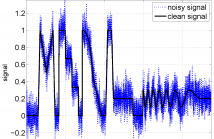
The IEEE Global Conference on Signal and Information Processing (GlobalSIP) is a flagship conference of the IEEE Signal Processing Society. GlobalSIP'15 will be held in Orlando, Florida, USA, December 14-16, 2015. The conference will focus on signal and information processing with an emphasis on up-and-coming signal processing themes. The conference will feature world-class speakers, tutorials, exhibits, and sessions consisting of poster or oral presentations. Outstanding papers will be selected for Best Paper Awards or Best Student Paper Awards; a paper is eligible for a best student paper award if the first author of the paper is a student. IEEE Signal Processing Society and National Science Foundation will provide travel grants to eligible students.
- Read more about Room Shape Reconstruction With a Single Mobile Acoustic Sensor
- Log in to post comments
- Categories:
 22 Views
22 Views- Read more about Seismic Interpretation of Migrated Data Using Edge-based Geodesic Active Contours
- Log in to post comments
Over the last few years, industry and academia have been shifting towards computer aided models for seismic interpretation because manual labeling and salt dome delineation is becoming very time consuming and labor intensive as the volume of seismic data is in the order of tera-bytes. In this paper, we have proposed an edge-based active contour with an arc length penalty using level set implementation for interpreter-assisted salt dome segmentation. We have designed an edge function and studied the effect of varying different active contour parameters on salt dome boundary detection.
- Categories:
 71 Views
71 Views- Read more about Constrained Clipping for PAPR Reduction in VLC Systems with Dimming Control
- Log in to post comments
Recently, OFDM has been considered for VLC to boost data rates and combat inter-symbol interference. However, VLC-OFDM inherits the disadvantage of high PAPR from traditional RF systems. Unlike RF signaling, both the maximum and minimum of VLC signals must be considered. Additionally, in order to support dimming control, the positive and negative dynamic-range constraints could be asymmetric. Clipping is the simplest way to satisfy the dynamic-range constraints, but it does not allow for any EVM distortion control.
- Categories:
 6 Views
6 Views- Read more about Microgrid Dispatch and Price of Reliability using Stochastic Approximation
- Log in to post comments
When properly operated, microgrids can facilitate the integration of stochastic renewable energy without compromising service reliability. However, in the context of multi-stage dispatching, finding the optimal day-ahead energy procurement that accounts for the variability of real-time operation is a computationally challenging task. This paper develops a computationally efficient two-stage economic dispatch scheme for a microgrid that exchanges energy with an external power system.
presentation.pdf
- Categories:
 8 Views
8 Views- Read more about Lane Detection Based on Improved Feature Map and Efficient Region of Interest Extraction
- Log in to post comments
- Categories:
 12 Views
12 Views- Read more about Data-Driven Cyber-Physical Detection and Defense Strategy Against Data Integrity Attacks in Smart Grid Systems
- Log in to post comments
- Categories:
 13 Views
13 Views- Read more about Multimedia Content Creation using Global Network Cameras: The Making of CAM2
- Log in to post comments
slides.pdf
- Categories:
 11 Views
11 Views- Read more about Sensor-Based Online Hand Gesture Recognition on Multi-Core DSPs
- Log in to post comments
- Categories:
 2 Views
2 Views
- Read more about Conjugate gradient acceleration of non-linear smoothing filters
- Log in to post comments
The most efficient signal edge-preserving smoothing filters, e.g., for denoising, are non-linear. Thus, their acceleration is challenging and is often done in practice by tuning filters parameters, such as increasing the width of the local smoothing neighborhood, resulting in more aggressive smoothing of a single sweep at the cost of increased edge blurring. We propose an alternative technology, accelerating the original filters without tuning, by running them through a conjugate gradient method, not affecting their quality.
GlobalSIP.pdf
- Categories:
 19 Views
19 Views